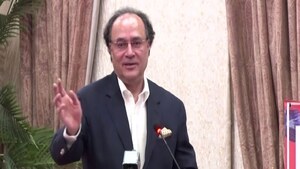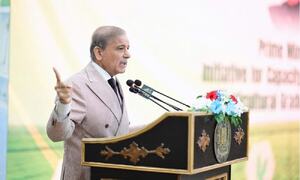India on Thursday reiterated it would not sign a key commercial contract with cricket's world governing body despite threats it could lose the right to stage the 2011 cricket World Cup as a result.
The International Cricket Council said on Wednesday that all nations had to sign the Members Participation Agreement (MPA) binding them to all ICC events until 2015, but India was playing spoilsport.
The Board of Control for Cricket in India (BCCI) previously said it would not sign the MPA until certain clauses were amended, stressing the contract would badly affect its own commercial deals worth a reported one billion dollars over the next four years.
ICC president Percy Sonn said in a statement that if the BCCI failed to sign up, it "could not continue as one of the joint hosts of the 2011 World Cup, thus putting the entire tournament in jeopardy."
India, which hosts the ICC's Champions Trophy from Saturday, won the right to hold the 2011 World Cup jointly with South Asian neighbours Pakistan, Sri Lanka and Bangladesh. "We have decided we will not sign the MPA in its current form," BCCI secretary Niranjan Shah told AFP on Thursday.
"That is the decision taken by the BCCI. We have been given a deadline till Monday to inform the ICC of our objections and we will meet that date. As of now we are not in a position to sign the MPA." BCCI vice-president Lalit Modi was even more categorical.
"A few nations may have signed the MPA but that is not our concern," he told reporters after a meeting of the BCCI's top brass in Mumbai earlier this week.
"We are not forced to play ICC events. Only if conditions suit us, we will play.
"The MPA in its existing form affects BCCI's commercial interests, gives ICC the right to change agreements unilaterally and affects the players' interests.
"The MPA would affect the BCCI and the players' interests for a period ranging from six to nine months. We are very unhappy with the way the MPA has been drafted."
India helps to drive cricket's economics, as five of the ICC's six main sponsors are Indian firms or the Indian branches of international businesses. If the country refuses to play ball, the ICC's proposed one-billion-dollar deal to sell broadcasting and sponsorship rights could be affected.
The ICC's current 550-million-dollar, seven-year deal with Global Cricket Corporation, a venture owned by Rupert Murdoch's News International, expires after the 2007 World Cup in the Caribbean.
The ICC hopes to double that amount in a new eight-year deal that covers 18 tournaments, including two World Cups, three Champions Trophies and the first two Twenty20 world championships. Other events include the ICC Trophy for associate members and the under-19 World Cups. The BCCI caused a major row ahead of the last World Cup in South Africa in 2003 when it declined to sign the MPA.
The BCCI objected to a clause which prevented its players from advertising products from rivals of the ICC's official sponsors for three months on either side of the World Cup.
After prolonged negotiations, India relented and sent a team for the tournament but the Global Cricket Corporation withheld almost 47 million dollars in payment to the ICC. Modi said the BCCI will not "fall into the trap" like it did before the 2003 World Cup. Significantly, the BCCI announced earlier this week that it would also make a bid for the ICC's global media and marketing rights for the next eight years.
The BCCI secured a whopping 612 million dollars for its own rights for the next four years from the Mumbai-based Nimbus Corporation. "We have successfully sold our own rights and I am confident we can do well with the ICC's global rights also," Shah had told AFP on Monday.
BR100
15,059
No Change
0 (0%)
BR30
42,931
No Change
0 (0%)
KSE100
148,815
No Change
0 (0%)
KSE30
45,206
No Change
0 (0%)





















Comments
Comments are closed.